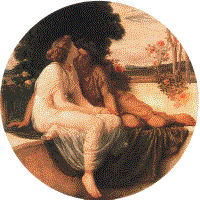
The Roman poet Catullus wrote of love between the nymph Acme and Septimius. I've found two translations (the first less literal than the second), and a nice painting by Lord Frederick Leighton (1830-1896) inspired by the poem.
Original:
XLV by Catullus (~83 BCE - ~54 BCE) Acmen Septimius suos amores tenens in gremio 'mea' inquit 'Acme, ni te perdite amo atque amare porro omnes sum assidue paratus annos, quantum qui pote plurimum perire, solus in Libya Indiaque tosta caesio ueniam obuius leoni.' hoc ut dixit, Amor sinistra ut ante dextra sternuit approbationem. at Acme leuiter caput reflectens et dulcis pueri ebrios ocellos illo purpureo ore suauiata, 'sic' inquit 'mea uita Septimille, huic uni domino usque seruiamus, ut multo mihi maior acriorque ignis mollibus ardet in medullis.' hoc ut dixit, Amor sinistra ut ante dextra sternuit approbationem. nunc ab auspicio bono profecti mutuis animis amant amantur. unam Septimius misellus Acmen mauult quam Syrias Britanniasque: uno in Septimio fidelis Acme facit delicias libidinisque. quis ullos homines beatiores uidit, quis Venerem auspicatiorem?
Translation #1:
Septimnius and Acme by Abraham Cowley (1618-1667) Whilst on Septimnius's panting breast (Meaning nothing less than rest) Acme lean'd her loving head, The pleas'd Septimnius thus said: "My dearest Acme, if I be Once alive, and love not thee With a passion far above All that e'er was called love; In a Libyan desert may I become some lion's prey; Let him, Acme, let him tear My breast, when Acme is not there." The god of love, who stood by to hear him (The god of love was always near him) Pleas'd and tickled with the sound, Sneez'd aloud; and all around The little loves, that waited by, Bow'd, and blest the augury. Acme, enflam'd with what he said, Rear'd her gently-bending head; And, her purple mouth with joy Stretching to the delicious boy, Twice (and twice could scarce suffice) She kissed his drunken rolling eyes. "My little life, my all" (said she) "So may we never servants be To this blest god, and n'er retain Our hated liberty again! So may thy passion last for me, As I a passion have for thee, Greater and fiercer much than can Be conceiv'd by thee a man! It reigns not only in my heart, But runs, like life, through every part." She spake; the god of love aloud Sneez'd again, and all the crowd Of little loves that waited by, Bow'd and blest the augury.
Translation #2:
SEPTIMIUS AND ACME by John Anthony Bernard Harrisson (1909-1983) He held her close against his breast and whispered soft and low "Heart of my heart, my little one, I love you, love you so! For ever and for ever, dear, no matter where I stand; In darkest Africa maybe, or India's coral strand, Or even should I chance to meet, while wandering out there, A green-eyed lion, I'd think of you, and thus confound his stare"! And as he spoke these words, Love smiled; the god was very pleased, And from the left toward the right in approbation sneezed. Then Acme, tilting back her head to kiss his tender eyes With lips like parted rose-buds which the golden sunlight dyes, Said, "Constant slaves of sovran Love we'll be, for in me glows A greater and a fiercer fire than e'er Vesuvius knows. Your love for me is very great I know, but it is true That yours is no whit greater than the love I bear for you"! And as she spoke these words, Love smiled, and delicately sneezed From left to right to indicate that he was very pleased! Now started on their favoured way they render love for love; Septimius prefers his bride to all your stars above. Your Britains and your Syrias, your rich and fertile fields, And to Septimius alone his loyal Acme yields Herself in love, for love's delights and passion's pleasures rare Afford a never-ceasing joy to this delightful pair: None ever saw two people happier than these two are, For love could not have flowered 'neath a better omened star!
